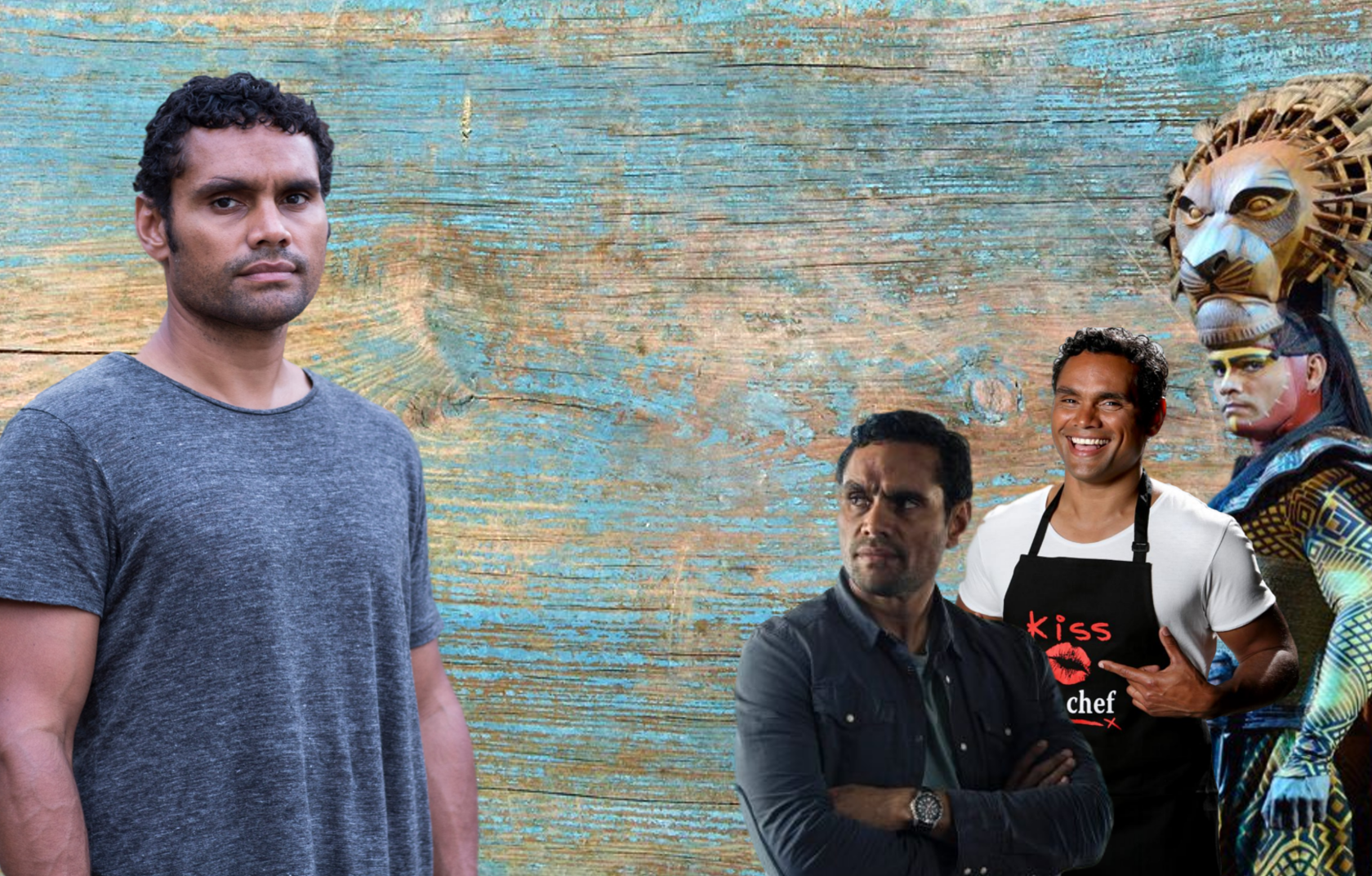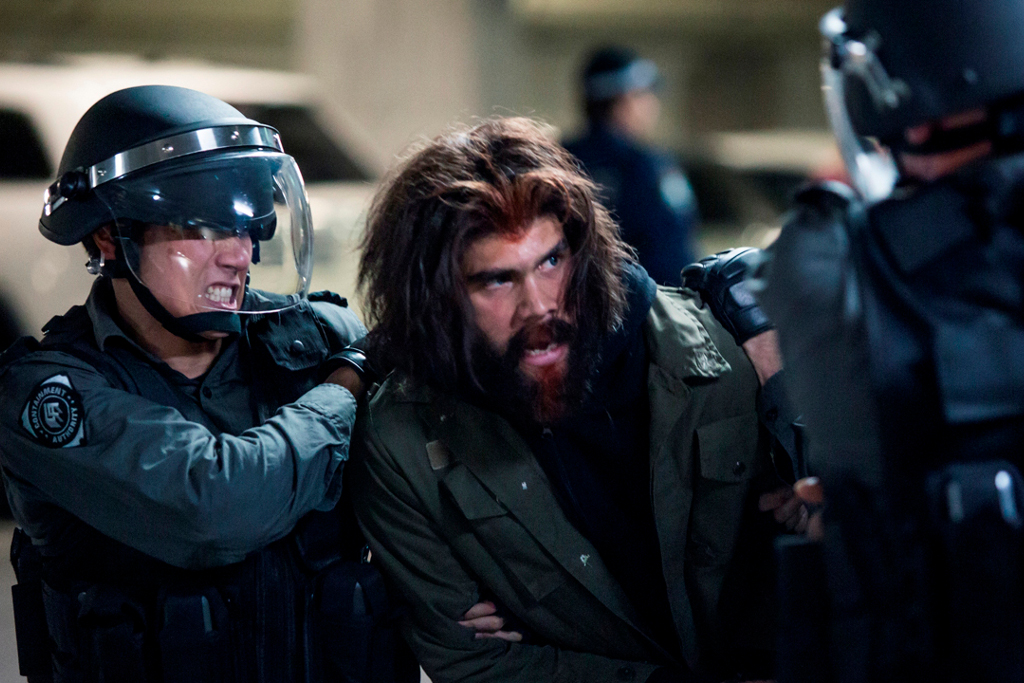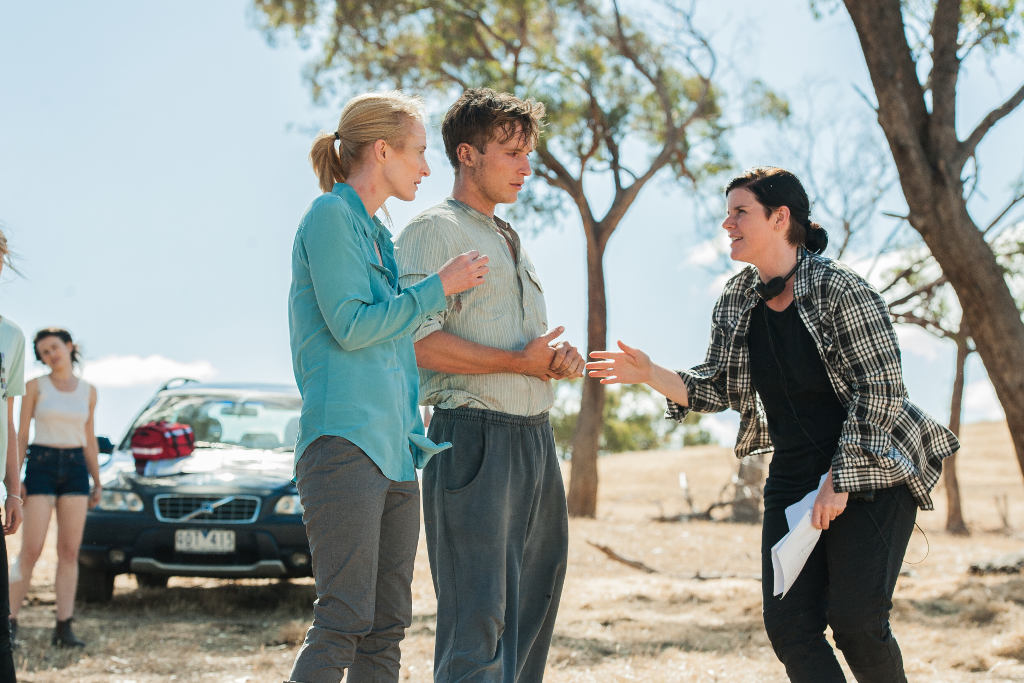It’s a little intimidating picking up the phone to talk to Rob Collins, the breakout star of Australian television in 2017.
Right before our interview, I powered through an episode of the ABC’s twisted sci-fi series Glitch. Collins has joined the cast in season two as Phil, an enigmatic new villain and antagonist to the Risen (people who have inexplicably returned from the dead) in Glitch‘s fictional Victorian town Yoorana.
As Phil, Collins is… there’s only one word for it. Yikes.
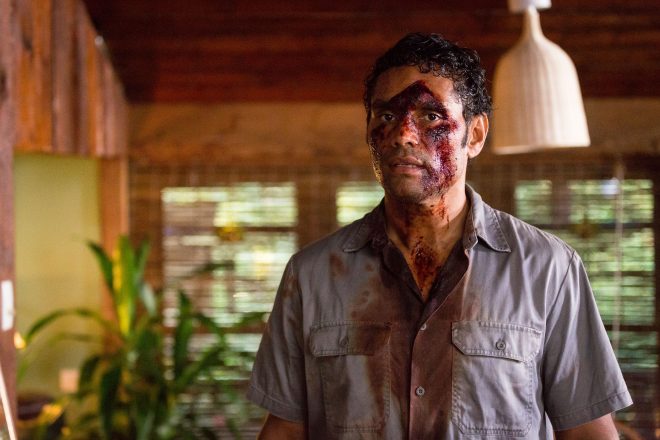
But when Collins answers the phone, he is softly spoken, thoughtful — nothing like the slightly terrifying men he seems to play exclusively for the ABC these days.
“I know. I think I’m going to get typecast soon,” Collins jokes when I mention how many shady dudes he seems to be inhabiting. Privately I think Collins isn’t in any danger of being typecast because, even as a relative late starter in the acting game, he has already displayed a huge amount of range.
Beginning his career on stage, as the imperious Mufasa in the recent Australian revival of The Lion King, Collins has a flair for the dramatics and an incredible physical vitality. And, though he began his formal acting training at NIDA at the relatively advanced age of 31, it didn’t take long for the powers that be in film and television to take notice. Now Collins is the new It Man for complex Aussie TV roles.
Just this year, Collins has starred as the smooth anti-hero Waruu in ABC’s Indigenous superhero hit Cleverman, as nice-guy hottie Jack in Channel Ten’s rom-com romp The Wrong Girl, and he’s made an explosive addition to the cast for Glitch‘s highly anticipated second season, which begins this week.
In truth, he’s everywhere; and if his Logie win last year (Best New Talent) indicates anything, this is just the beginning for Collins.
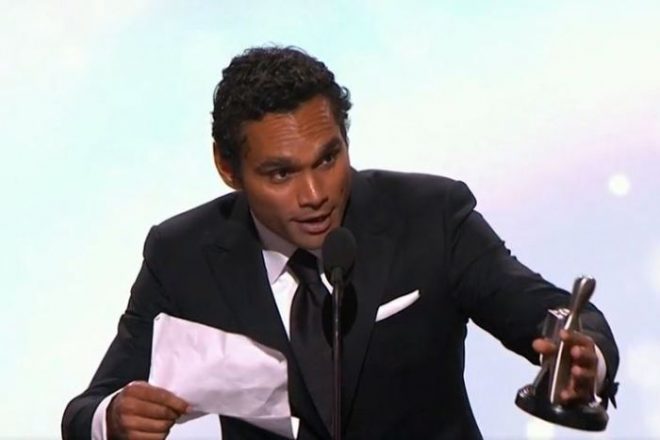
But, though his career is skyrocketing, Collins still appears to be a gentle small-town boy. Born and raised in Darwin (and descended from the Tiwi Islands, just north of mainland Northern Territory), Collins takes every opportunity he can amid his busy filming schedule to head home, where his wife, Laetitia Lemke, and their three kids still live.
Time away from home seems to be the “one noticeable thing” for Collins about his new life as a TV actor. “It’s not terribly different,” he says. “But I’m spending more time away from home, so I don’t see my family a lot lately.”
But he seems content with even the small stretches of time he gets back in Darwin, “on dad duty”. He says the weather there is “gorgeous… not too sunny. Perfect.” When I tell him it’s raining back in Melbourne, he laughs. “Sucks to be you!”
No matter how much time Collins spends filming in Melbourne or Sydney, Darwin is still his home. “I’ve grown up here,” he explains, “I was raised here.”
New Guy In Town
Collins has just joined the season two cast of ABC’s sleeper hit Glitch, the sci-fi/body horror/magical thinking drama about several residents of a fictional Victorian town, Yoorana, who have inexplicably risen from the dead. The first season of Glitch premiered in 2015, when ABC (perhaps ill-advisedly) beta-tested the series for a ruthlessly short period on iView.
Back then few people felt the impetus to seek the show out during its initial run. However, when ABC sold the series to Netflix — where it joined a number of other Australian shows enjoying a second life on the streaming service — Glitch rapidly picked up a following. Now, as Aunty prepares to premiere season two on ABC and iView, a swollen army of Glitch lovers eagerly anticipates its return.
It’s into this cult furore that Collins dives, as enigmatic new antagonist Phil. “It was slightly intimidating,” Collins admits, when I ask what it was like to join the cast, “because I was such a huge fan of the show.” It’s such a cool concept, he explains. “It was beautifully shot. It was obviously a high calibre show, and so even to be asked to audition was really exciting.
Phil — step-father to Beau (the divine Aaron McGrath) — arrives in Yoorana on a mission. From the very beginning there’s something a little spooky about him; spooky even for a show where Risen dead are wandering around a country town.
“It’s always fun to play [Phil] because those characters are always up against it,” Collins says. “It feels like those characters have more obstacles to overcome because they’re on the outer.”
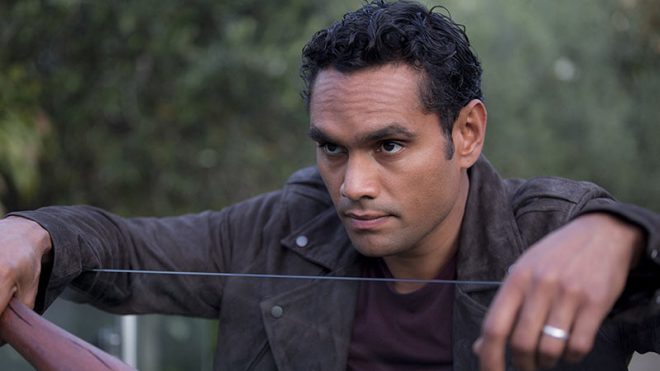
I tell Collins that Phil reminds me a bit of Waruu, in the sense that they’re both a bit shady, and he agrees there’s a definite similarity. “You know, Waruu, at the end of season one [of Cleverman], has kind of ostracised himself and has to build his way back up. Phil, similarly, has no one. He has an undetermined mission and obstacles in his way.
“As an actor it’s always fun to play those characters. And both Waruu and Phil are really physical roles as well. You’re sort of jumping around and slashing and punching and kicking. It’s a lot of fun.”
Still, I wonder how difficult it is to connect with unlikeable, or villainous characters like Phil and Waruu. Collins explains, a little tongue-in-cheek, “They say — they being the acting gods — that you should never judge a character for what they do. Every character, from Hannibal Lecter down, believes in what they’re doing, that it’s the only course of action.
“I guess your way to get around that, especially if you’re playing a character who does the most reprehensible things, is to justify it in a way. You know, why is this character in this position and why does he have to commit to this?”
He’s silent for a beat, then clarifies. “At the end of the day, it is just a character, and it’s kind of fun to leave yourself for a little while.”
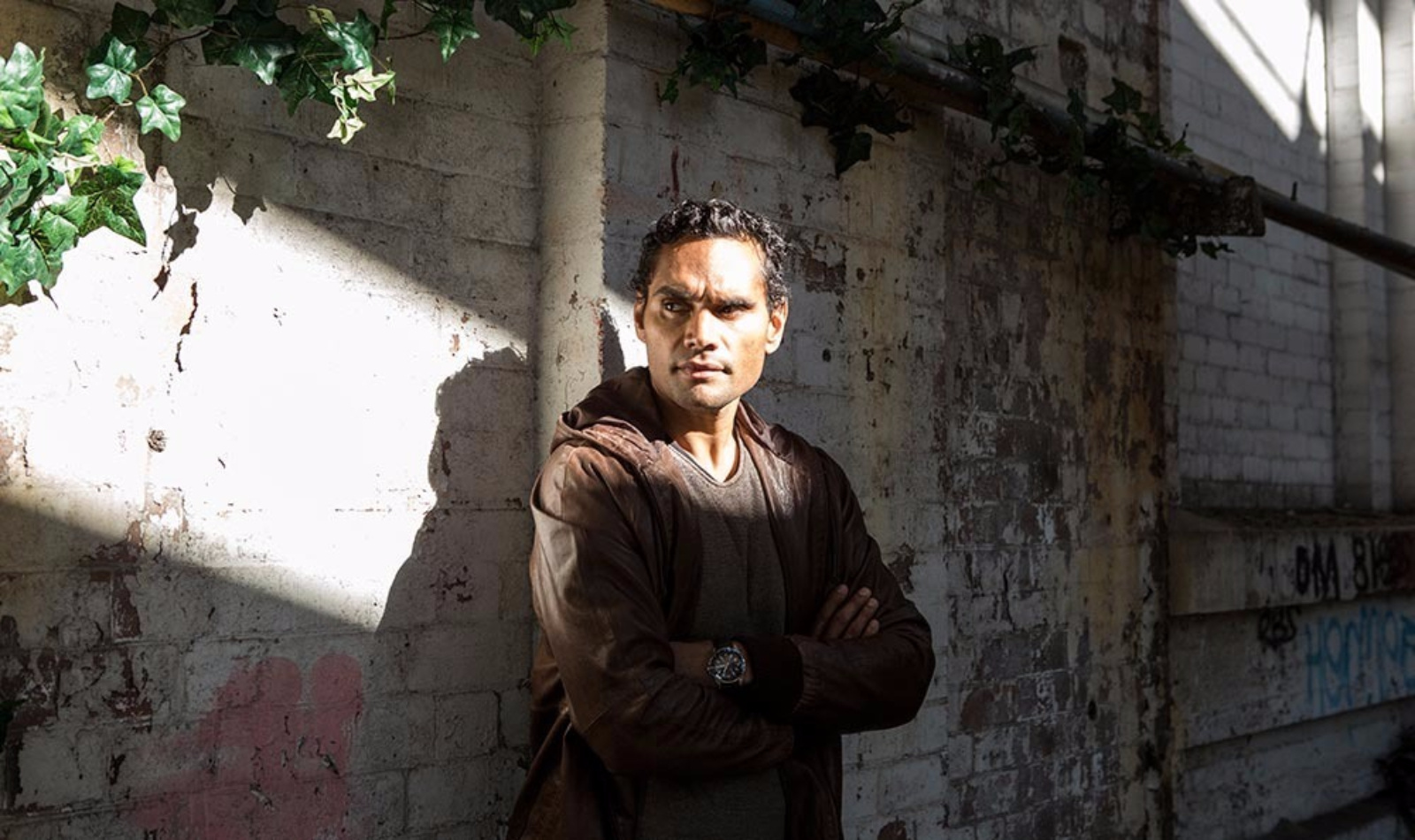
A Late Bloomer
For some with such a rapidly expanding portfolio, the 37-year-old actor came to the game quite late. After years working in the music industry, Collins re-calibrated and took a punt on acting, beginning his training at the National Institute of Dramatic Art (NIDA). “The average age of the class I went through at the time was 23 to 25,” he explains. “I went in and I was 31.”
He tells me his time at NIDA was one of the only times he’s noticed his age, when compared with other breaking actors in the industry, many of whom, like McGrath and Cleverman‘s Hunter Page-Lochard, are his on-screen colleagues. “In my mind, I am perpetually 19, so it’s always shocking to me when someone reminds me how old I am. Or when I see myself in the mirror.
“Acting was the first thing I had attempted what people overwhelmingly said I was good at.”
“I did some theatre at the STC last year, A Midsummer Nights Dream, where a majority of the cast were really young, and because that was such a physical role it was the first time I felt physically hindered by my age. On screen, I’m not that aware of it.”
That production of A Midsummer Night’s Dream, which I saw Collins perform at the Drama Theatre in Sydney last year, isn’t the only physical role Collins has taken on. Aside from running all over the stage at the lover Lysander for Sydney Theatre Company, Collins also premiered onstage as the imperious Mufasa in a revival of the Broadway favourite The Lion King.
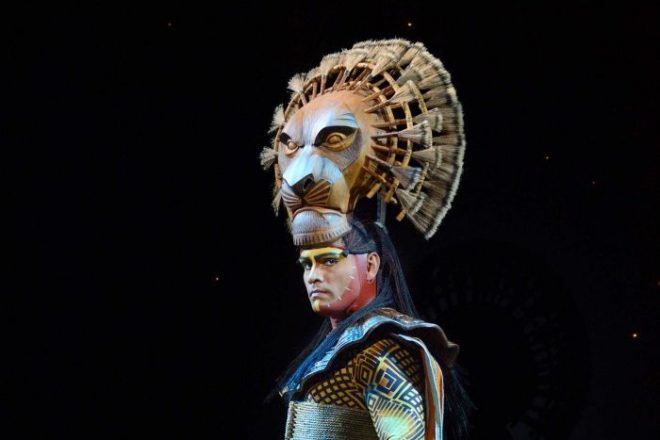
“Oh god, it was really tiring,” he tells me when I ask him about Kip Williams’ madcap Midsummer. But Collins prefers to see his age as an advantage. “I think it’s worked out the best way it could. And, being a bit older, I was a lot more grounded. I mean, it’s an environment where you put yourself out there and the work is judged and critiqued, and being a little older kind of helps me to deal with that. It didn’t affect me that much; I was just really keen on developing.
“There are times, especially when starting out, where it felt like, ‘Oh, what am I doing?’,” he admits, when I press him on the challenges of his new career. “I think to start out with I was just really keen to do something new. It was the first thing I had attempted what people overwhelmingly said I was good at. That really encouraged me. And I think being older has helped me weather the storms and the setbacks you get sometimes.”
Collins seems to have his head screwed on, regarding the challenges and setbacks of the acting world. And he certainly knows how to choose a killer project. “Whatever the opportunity is, big or small, I’ll always give it attention,” he tells me. “Because everything you do is development, and you never want to get stale. So anything, big or small, can be a learning experience.”
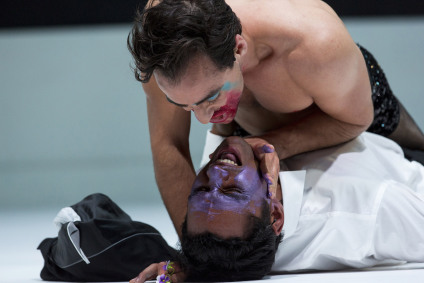
The Clever Man
I ask Collins about Cleverman, the totally unique ABC TV project that has taken Australia by storm over the past two years. Though the show continues to buzz, both here and in the US, Collins is remarkably humble about it all. “You never get the sense that going into it that you’re doing something that unique,” he says. “Not to downplay its impact, but I think all that stuff comes afterwards.
“It’s only now, after it’s gone to air and seeing all the reactions to it, I’ve gone, ‘Actually, yeah, this is kind of unique and it is kind of special’. There’s not a lot of shows around like this, but I have to say that feeling comes in the wake of the broadcast.”
Collins does admit that he “knew first off, when I was introduced to the project, that it was a story that I was instantly attracted to.” The series, which is the world’s first sci-fi show telling Indigenous stories, has just finished screening its second season on the ABC (and Sundance TV in the US). But Collins remembers the feeling of instant attraction back when he first joined the show.
“My first introduction to it was an audition between Waruu and Koen,” he tells me. “So it had this really strong brother story, elder brother story. And that’s just something that really appeals to me, I think, because I’m an older brother to two siblings.
“This idea that you could marry Aboriginal mythology with sci-fi, was really, really interesting — and if anything I was kind of like, ‘What’s this going to look like?’. The concept was so out there that I was anxious about what the end result might be. But it’s really taken off and it’s got a strong following both here and in the US as well.”
Australia has a stable of highly regarded Indigenous actors, including Deborah Mailman and Uncle Jack Charles, both of whom feature in the Cleverman cast. Collins is part of a younger generation of Indigenous performers coming up during a time when Aboriginal stories are increasing in value in the Australian film and television industry.
Still, there aren’t many of them gaining mainstream exposure and I wonder if the pressure of responsibility to his community gets to him.
“I have to say that sense of responsibility is starting to creep in now,” he tells me. “For the most part I process work as an actor without necessarily thinking about the the fact that I’m an Indigenous actor who has anything broader to say. But I’m two or three years into this career now and I’m at a point now where I’m starting to understand a bit more that there are people in the indigenous community that look up to people in my position.
“There have been many fine Indigenous actors, so it’s not a new thing, but it’s only now that I’ve begun to think, ‘Well, actually I’m in a unique position.'”
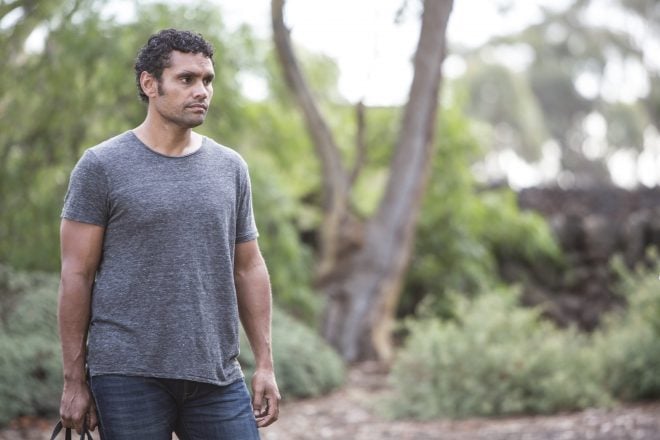
Though there’s a burden being one of few diverse voices in your field, Collins appears to appreciate the responsibility of the power that comes with his increasing profile.
“Indigenous issues and Indigenous people generally are close to my heart for obvious reasons,” he says, “and so if I could use that in the future to help out or be a positive role model, then that’s something I’m aware of and keen to do.
“As you say, there’s not a lot of us around in terms of the broader picture. So it does feel like it falls to an Indigenous actor to give Indigenous faces and stories some strength.”
A Way Forward
We turn our attention to The Wrong Girl, Collins’ other big TV project for 2017. Based on Zoe Foster-Blake’s bestselling novel of the same name, The Wrong Girl centres on Lily (Jessica Marais), a producer on a morning breakfast show who is caught in a love triangle between her best mate (Ian Meadows) and her show’s hot celebrity chef, Jack (Collins).
The show is a fun romp, where Collins gets to stretch his comedic muscles (and his actual muscles, as Jack often appears shirtless on the show much to many viewers’ delight) — which Rob tells me feels entirely different to his work on the set of Glitch and Cleverman.
“Cleverman — because of the social commentary and the political slant of the show — felt a lot more, for want of a better word, serious. Or at least as an actor I approached it much more earnestly. I think being an Indigenous actor in a show that’s 80 percent Indigenous people, telling Indigenous stories, there was a sense of responsibility to get it right — to deliver.”
It’s worth noting that Collins’ casting as Jack in The Wrong Girl is an interesting progressive step for Australian TV. In Foster-Blake’s book, Jack is a blonde white dude, so it’s refreshing to see a bit of colour-blind casting from the execs at Channel Ten. (Though, considering Collins’ intense good looks, it’s no wonder he was a shoe-in for the role of a hunky TV presenter.)
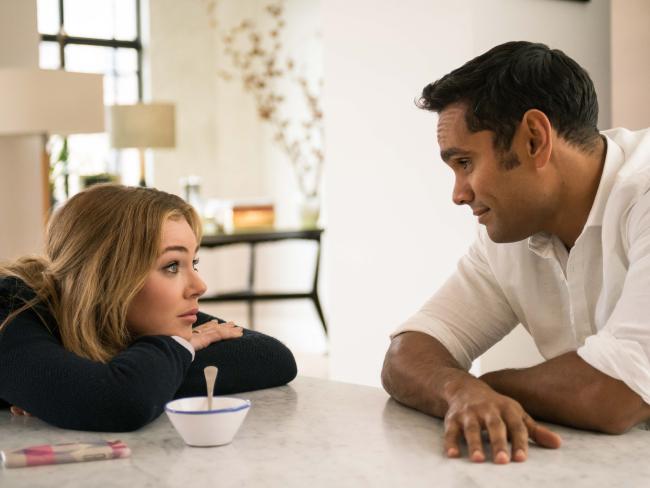
There’s no doubt Collins is translating his talent into a slew of positive experiences in Australian TV, which helps when he so often misses his family and his home in Darwin. That “time away” is still the biggest challenge for Collins as an actor. “Yeah, it’s the time away from family. It’s having to fly to different states. After a while that can get a bit taxing.”
But Collins is pretty positive about the makeshift family he’s made of the cast and crew in his various on-set roles. “I know it sounds cliché because everyone thinks to say it, but I mean it earnestly. I’ve made a lot of friends and I keep up with them, and I’ve worked with a lot of veterans of stage and screen, and everyone without exception has been really willing to share their knowledge and has kind of taken me under their wing.
“When the cameras stop rolling or when the show goes down, you’re able to have this kind of rapport, and in a sense they become your family for the six weeks or three months or whatever — however long it is. I think I’ve been really blessed thus far to work with some absolute gems.”
I ask him what he’d like to see done differently on Australian television, if he could. It’s a tough question, and he takes a while to answer. “I think it feels like we’re heading towards this direction,” he says eventually, “but I’d like to see more uniquely Australian stories being told in a really bold way.
“It used to be the case, especially when I was growing up, you had to go to the movies to see this astounding level of work. And, actually, it’s not the case now. So I think the way forward is more uniquely Australian stories told in a world-class cinematic way.”
—
Glitch season two premieres 8.30pm tonight on ABC.
—
Matilda Dixon-Smith is Junkee’s Staff Writer. She tweets at @mdixonsmith.
